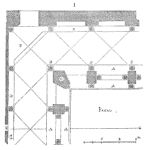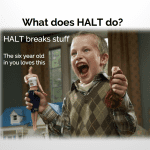
This video clip looks like a disaster but is actually a visualization of precision reliability engineering………. right after a disaster . [Read more…]
Your Reliability Engineering Professional Development Site
Author of Apex Ridge articles and co-hostSpeaking of Reliability.
This author's archive lists contributions of articles and episodes.
by Adam Bahret Leave a Comment

This video clip looks like a disaster but is actually a visualization of precision reliability engineering………. right after a disaster . [Read more…]

Many of our customers (internal/external) trust us when we say that a Weibull analysis is the best approach to understanding what the data set is telling us. We then take their data set, do something mysterious where no one can see us, and then present these accurate predictions as to what is going to happen with a given population of the product at some future date. [Read more…]
by Adam Bahret Leave a Comment

Adam and Fred discussing the soft skill of presenting. Good engineer become great with wonderful presentations skills.
ᐅ Play Episode
by Adam Bahret Leave a Comment

Often when we request an analysis from an engineer we run with the results and don’t ask a lot of questions about the analysis itself. Having done a lot of analysis I am familiar with all the assumptions and estimations that go into making a calculation work. But that means that the results of the analysis are only relevant to those assumptions and estimations. The analyst may have to make the following “calls” without additional input or only a small fact-finding mission. [Read more…]
by Adam Bahret Leave a Comment

Adam and Fred discuss the need to understand where and how a product is used.
ᐅ Play Episode
by Adam Bahret Leave a Comment

My career path in systems engineering. I don’t mean my professional engineering career exactly. My systems engineering portfolio I would say started at about the age of nine if I had to pick a point in time. At nine I made a small hydro-electric power plant in the stream behind my house so I could have light in the woods. I could have taken a purely electrical approach, battery, wires, bulb, or a chemistry approach, matches, wood, oxygen, or a mechanical approach (actually how do you make light mechanically? Sparks??) anyway… But I took a systems approach. [Read more…]

I don’t know if you recall a post from my blog, “HALT Testing is Not Always In a Chamber”, that discussed what I consider to be the first documented HALT test. Well I just found a video of the design solution in action and it is super cool. I discussed how during  the development of the F1 rocket motor, for the Apollo space program, they solved a design issue with a HALT technique, although they didn’t call it HALT at the time. The issue they were attempting to solve was the thrust nozzles fracturing due to oscillating vibration. [Read more…]
the development of the F1 rocket motor, for the Apollo space program, they solved a design issue with a HALT technique, although they didn’t call it HALT at the time. The issue they were attempting to solve was the thrust nozzles fracturing due to oscillating vibration. [Read more…]
by Adam Bahret Leave a Comment

Adam and Ann Marie discussing Software Reliability best practices
ᐅ Play Episode
by Adam Bahret Leave a Comment

This is the third session from the Annual Apex Ridge Reliability Seminar held in Boston.
In this session, I discuss the methodology of HALT and how to connect it with program tools and objectives.
The philosophy of HALT is often misunderstood simply due to its name and acronym, “Highly Accelerated Life Testing” (HALT).
It is not an accelerated life test, it’s really not even a test. HALT is a process of increasing stress on a design to induce failures for the purpose of learning about the design and improving its robustness.
It’s a discovery process. [Read more…]
by Adam Bahret Leave a Comment

Adam and Keegan discussing all the interesting factors of a career in Reliability Engineering
ᐅ Play Episode
by Adam Bahret Leave a Comment

This is the second session from the Annual Apex Ridge Reliability Seminar held in Boston.
The session focus was how to best use specialized testing technique outputs as effective program inputs. There are simple steps for hooking the information from the test data into the correct program management decision points.
Very often opportunities are missed in programs by aligning testing outputs with incorrect program phases. [Read more…]
by Adam Bahret Leave a Comment

We just held the Annual Apex Ridge/NEHALT seminar, sponsored by Qualmark. We had a full house again which was great. This year’s seminar was in three sections.
The first section discussed the methodology for balancing reliability with other product goals during a development program.
The second session was on Reliability testing tools and how to use their outputs to steer program decisions and design improvement. The third session was on specialized HALT testing techniques. [Read more…]
by Adam Bahret Leave a Comment
by Adam Bahret Leave a Comment

DFMEA’s definitely have a bad reputation as exercises that consume an enormous amount of time and unfortunately yield little value to the program.
And can be miserable to experience.
A quote from a customer “We aren’t going to do any more DFMEA’s because we feel a bit traumatized by the last round.”
I have also seen DFMEA’s be a cornerstone to a design program using its resources with surgical precision to improve the product.
I started to think about the differences between the ineffective and effective DFMEA’s. Here are some of the steps that I believe make the “good ones” GOOD. [Read more…]
by Adam Bahret Leave a Comment

Adam and Fred discussing the problem of estimate the future benefit for an investment in testing today.
ᐅ Play Episode
 Ask a question or send along a comment.
Please login to view and use the contact form.
Ask a question or send along a comment.
Please login to view and use the contact form.